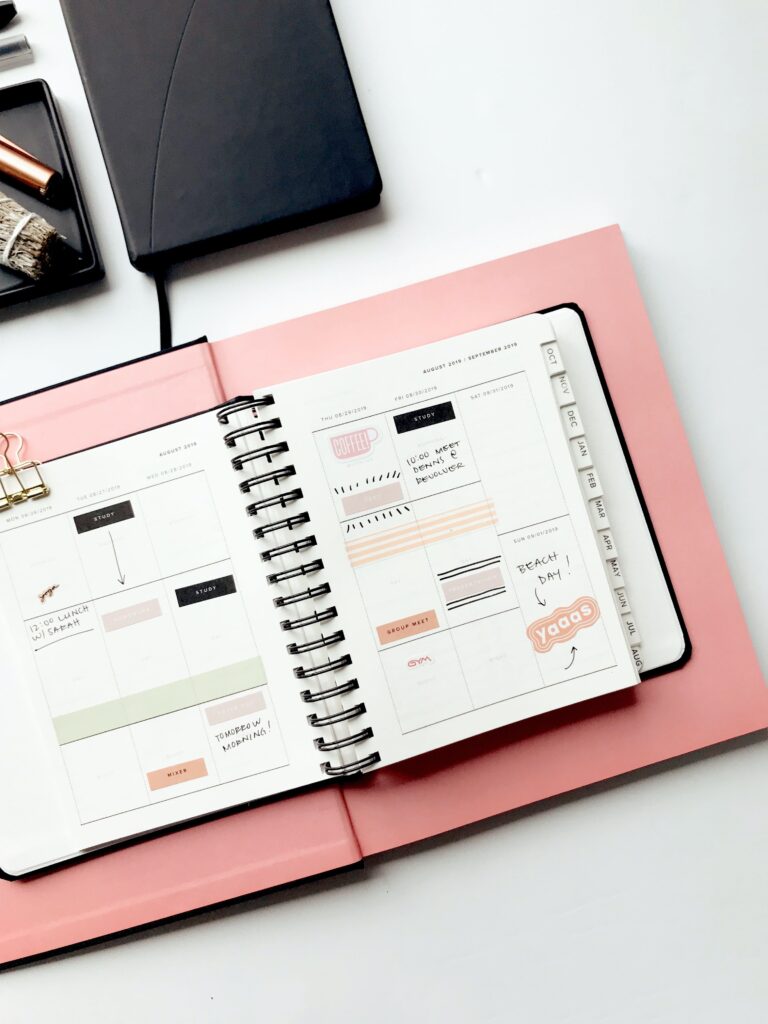
Have you ever experienced that some of your tasks never seem to get done, even though they might be important and some even urgent? It is because they trigger some aversion, fear, worry, insecurity or boredom. Here is how you can get them done.
1. Make a list
Put aside 20 minutes and a take a fresh notebook. Start by making a list of all those things that you want to get done. This will create some free mental space and release some of the worries around forgetting them or the repercussions of not completing them.
2. Sort your list
Go through your list and sort your items into four categories:
a) urgent and important,
b) urgent but not important,
c) important but not urgent,
d) neither urgent not important
3. One off tasks or recurring jobs
One-off tasks may repeat themselves once in a while, like cleaning the garage, shopping for a winter jacket or creating a photo book.
Recurring jobs repeat themselves daily, weekly or monthly, like washing laundry, grocery shopping, paying bills or ironing.
Sort each of the categories a) to d) into one off tasks or recurring jobs.
4. Done automatically or not
Some of the things you’ve written done will get done automatically so you don’t need to spend time on them. Even though you might not necessarily like doing those things, they do not have an aversion big enough attached to them for you to avoid them at all cost.
Those which do not get done automatically need to be scheduled.
5. Scheduling
The tool I prefer to use is the Google calendar. It synchronizes with your smartphone and sends you a pop-up reminder if you set them accordingly.
– One-off tasks: Schedule them according to their urgency and importance into your calendar. Sit down, look over your timing for the coming week, or month and make an appointment with yourself to do one at the time.
– Recurring jobs: Create calendar entries and set them to repeat daily, weekly or monthly. Allow enough time and re-adjust if needed.
6. Pop-up reminders
If you use Google calendar you can add pop-up reminders from minutes to hours and days prior to the appointment you’ve set. Pick as many or few as you need to remind yourself, without annoying yourself with too many.
7. Reminders
I also use the reminders app on the computer and have a weekly schedule list with my recurring jobs. This works well if you feel good about ticking off items you’ve done.
These reminders also have the option to not only remind you of a specific time and date but also at a location. If you need to remember to buy something in a specific shop when you’re next there, set up a location reminder.
8. Dealing with aversion
If you notice aversion and avoidance with certain specific things after you’ve organized them, it is time to seek help in clearing those patterns. There are ways to get rid of them so you will be able to do your tax with much less time spent worrying and avoiding the issue!
9. Plan, plan and re-plan
Many times people stop after their first trial. Remember that 99% of the time the NASA flies to the moon they reprogram their route. If whatever you’ve sorted, scheduled, planned didn’t work out, start by changing and adapting to better suit your needs.
Maybe you need to
- set more reminders?
- allow more time?
- Ask for someone’s help?
Remember:
- If you work better with rewards, plan them in as well.
- Do not over-schedule your diary. If you don’t plan time to eat, relax and sleep you will easily feel overwhelmed.
- If you didn’t do what’s in the diary, re-plan it for the following day or week.
As Marie Forleo says: If it’s not planned in your diary, it’s not real.
